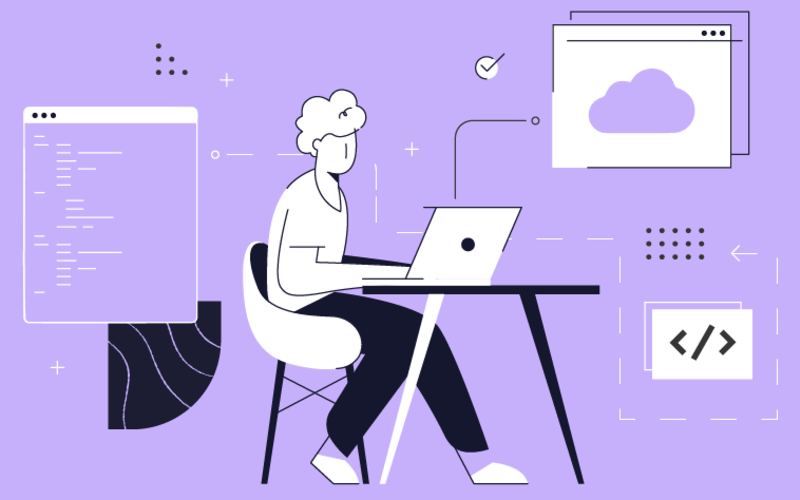Experts in the field bring specialized skills in cloud architecture, security, and configurations of APIs for cross-platform applications, machine learning capabilities, and data and resource management.
Google Cloud Platform (GCP) is a top-notch collection of cloud computing services. It utilizes the same infrastructure that supports popular Google products such as Google Search and YouTube. Essentially, GCP provides a wide array of services like computing, cloud storage, networking, big data, machine learning, mobile and web application APIs, machine learning capabilities, and more.
Businesses gravitate towards GCP for its advanced data analytics capabilities, robust machine learning tools, and extensive network of secure data centers globally, which provide unmatched scalability and reliability.
However, here lies the challenge. The sophisticated nature of GCP's offerings often necessitates a dedicated expert. These experts understand the nuances of cloud infrastructure and are adept at tailoring solutions to align with specific business goals and compliance requirements. Their expertise is crucial in leveraging the full potential of GCP's complex services and ensuring optimal configuration and security.
Good GCP engineers will combine both top-down and bottom-up experience, meaning they will simultaneously understand the big architectural picture of the company’s services, their configurations, and the requirements for their existence. However, at the same time, they need experience with developer-facing APIs, their capabilities, limitations, rate limits, etc.
Below are some of the essential skills we believe GCP experts should possess.
Knowledge of cloud services
A GCP expert should comprehensively understand the range of services offered by Google Cloud Platform, including but not limited to computing services like Compute Engine and App Engine, data storage services like Cloud Storage and databases like BigQuery, and networking services. This knowledge enables them to select the right combination of services for each project, understanding how they can be integrated to build efficient, scalable, and robust cloud solutions.
Designing solution architecture
This involves designing a comprehensive architecture that leverages GCP's capabilities to meet business requirements. It requires skills in architecting network topologies, cloud resources, data processing, load balancing, designing for security and compliance, planning for disaster recovery, and ensuring cost efficiency. The GCP expert should be adept at creating scalable architectures, resilient to failures, and capable of handling varying loads.
Cloud, service, and application security
Given the critical importance of security in the cloud, an expert should be well-versed in GCP's security tools and features, such as Identity and Access Management (IAM), Virtual Private Cloud (VPC), and security keys. They should also know best practices for securing applications and data on GCP, including encryption, network security, and compliance with various industry standards and regulations.
Familiarity with programming languages commonly used in GCP environments (like Python, Java, and Go) is essential. The expert should understand how these languages interact with GCP services and how they can be used to develop, deploy, and manage applications on the platform. Additionally, they should be comfortable working with development environments and tools commonly used alongside GCP.
It is important to know that many services have platform-specific SDKs or expose consumable APIs. GCP experts should know installation procedures, usage, capabilities and limitations, rate limiting, and legal implications for using them across a wide spectrum of development platforms (Android, iOS, Flutter, frontend, and backend).
Containerization
Proficiency in containerization involves understanding container-based development and orchestration tools like Docker and Kubernetes (especially Google Kubernetes Engine). This skill is crucial for deploying scalable and manageable microservices architectures. The expert should know how to containerize applications, manage container clusters, and ensure efficient deployment and scaling of containers.
Automation (CI/CD, infrastructure, etc.)
Automation in GCP involves setting up continuous integration and continuous deployment (CI/CD) pipelines, automating infrastructure provisioning with tools like Terraform or Google Cloud Deployment Manager, and automating operational tasks. This skill is essential for maintaining a fast-paced, efficient, and consistent development and deployment process, enabling teams to rapidly release and update features while ensuring the reliability and stability of applications.
Often GCP experts work in the DevOps domain, where they are responsible for simplifying both containerization and automated deployment/management of business-specific applications. It's easier to automate the management of GCP resources based on the requirements of deployed applications instead of manual configuration.
The skills listed below are not necessarily necessary for a GCP expert to possess, rather they are a showcase of seniority and broader knowledge.
Machine learning and AI
Expertise in Machine Learning (ML) and Artificial Intelligence (AI) on the Google Cloud Platform involves a thorough understanding of GCP's AI and machine learning services. This includes proficiency with tools like AI Platform for building custom ML models, AutoML for training models with minimal ML expertise, and TensorFlow for deep learning applications. Such skills are essential for developing intelligent applications that can analyze large datasets, provide predictive insights, and automate decision-making processes.
Networking expertise
Networking expertise in GCP encompasses a deep understanding of cloud networking concepts and the ability to design, implement, and manage robust network architectures. This includes configuring virtual private clouds (VPCs), setting up Cloud Load Balancing for distributing network traffic, implementing Cloud CDN for content delivery optimization, and establishing Cloud Interconnect for hybrid connectivity. Mastery in these areas ensures secure, efficient, and scalable networking solutions.
Security expertise
Security expertise in GCP is about ensuring the secure deployment and operation of applications and data on the cloud. This requires knowledge of GCP's security tools like Identity and Access Management (IAM), Cloud Security Command Center, and encryption services. An expert in this field is adept at implementing best practices for network security, data protection, identity management, and compliance with regulatory requirements, thereby safeguarding cloud resources against threats and vulnerabilities.
Project management
Effective project management in the context of GCP involves overseeing cloud projects from conception to deployment. This skill is about applying agile methodologies, coordinating cross-functional teams, managing timelines and budgets, and ensuring project deliverables meet business objectives. A good cloud project manager must balance technical know-how with strong leadership and organizational skills.
Multi-cloud/hybrid-cloud strategies and cloud migrations
Proficiency in multi-cloud/hybrid-cloud strategies involves designing and managing cloud solutions across various cloud platforms, including GCP, AWS, and Azure. This skill includes understanding how to architect solutions that leverage the best features of each platform and how to integrate them seamlessly. Additionally, expertise in cloud migrations is critical for planning and executing the transition of applications and data from other environments to GCP, ensuring minimal disruption and optimal performance post-migration.
Soft skills
Soft skills are crucial for a GCP expert to communicate, collaborate, and resolve problems effectively. This includes strong verbal and written communication abilities, critical thinking, teamwork, and adaptability. Translating complex technical concepts into understandable terms for non-technical stakeholders is invaluable. These interpersonal skills are key to ensuring successful project outcomes and maintaining productive working relationships.
Interview questions to ask a potential candidate
Because of the scope of work that Google Cloud Platform experts face, it is difficult to find a unified list of questions to ask during the interview. Below are great starting points, but it's important to know you should tailor your questions to your business needs.
1. How would you ensure data security and compliance when using GCP services?
Expected answer: The candidate should discuss implementing encryption for data at rest and in transit, using Google Cloud's Identity and Access Management for fine-grained access control, and aligning with compliance frameworks like GDPR or HIPAA using GCP's compliance resources.
2. How do you monitor and troubleshoot performance issues in a GCP environment?
Expected answer: They should mention using Google Cloud's operations suite for monitoring, setting up alerts, analyzing logs with Stackdriver, and employing Cloud Trace and Cloud Debugger for in-depth performance analysis and troubleshooting.
3. How would you optimize costs for a large-scale application running on GCP?
Expected answer: The candidate should talk about selecting appropriate compute resources, using autoscaling, employing cost-effective storage solutions, and monitoring and managing resources with Google Cloud's cost management tools.
4. What are the processes and considerations for migrating an existing application to GCP?
Expected answer: They should describe assessing the application's architecture and dependencies, planning for data migration, choosing the right GCP services, considering security and compliance requirements, and using migration tools like Cloud Migration.
5. What are some reasons to choose GCP over other cloud platforms like AWS, DigitalOcean, Heroku, Fly, etc?
Expected answer: Look for answers highlighting GCP's advanced data analytics and machine learning capabilities, superior network infrastructure, competitive pricing, strong commitment to sustainability, and integrations with various Google services.
6. Describe your experience with BigQuery.
Expected answer: The candidate should describe how they have used BigQuery for large-scale data analytics, mentioning aspects like running SQL queries on large datasets, data warehousing, and integrating with data visualization tools.
7. Describe your experience managing services (APIs and client SDKs) for developers.
Expected answer: They should talk about designing, deploying, and managing APIs on GCP, using tools like Apigee or Cloud Endpoints, and providing well-documented SDKs for various client applications.
8. What are service accounts and projects in the context of Google Cloud?
Expected answer: The answer should include that service accounts are special Google accounts used for authentication and granting permissions to GCP services, while projects are containers in GCP that group resources and services for management and billing purposes.
9. How is Firebase related to GCP?
Expected answer: Candidates should mention that Firebase is a mobile and web application development platform that integrates with GCP, offering backend services like hosting, real-time databases, and user authentication.
10. Can you discuss your experience implementing AI and machine learning models on GCP?
Expected answer: Consider responses that include using an AI Platform for building, training, and deploying custom machine learning models, leveraging pre-built ML models with APIs, and managing ML workflows on GCP.
Google Cloud Platform (GCP) is used by a wide range of industries and applications. Some of the industries that utilize GCP include:
- Technology: Many technology companies leverage GCP for their cloud infrastructure needs, including startups, software-as-a-service (SaaS) providers, and technology giants.
- Healthcare: GCP is used in the healthcare industry for storing and analyzing large volumes of medical data, enabling secure and scalable solutions for electronic health records, medical imaging, genomics, and telemedicine.
- Finance: Financial institutions utilize GCP for its robust security features and compliance capabilities. GCP enables secure storage and processing of financial data, fraud detection, risk analysis, and high-performance computing for complex financial models.
- Retail and eCommerce: GCP provides the infrastructure and tools necessary for retailers and eCommerce platforms to handle high volumes of traffic, process transactions, and analyze customer data for personalized marketing and recommendations.
- Gaming: The gaming industry benefits from GCP's scalability and global network of data centers. GCP enables game developers to build and deploy multiplayer games, handle real-time data streaming, and utilize machine learning for player behavior analysis.
- Media and entertainment: GCP is used by media companies for content storage, streaming, and delivery. It enables the processing and analysis of large media files, transcoding, content recommendation systems, and personalized user experiences.
- Manufacturing: GCP helps manufacturing companies optimize their operations by leveraging IoT (Internet of Things) devices for real-time monitoring, predictive maintenance, supply chain management, and quality control.
- Education: Educational institutions use GCP for online learning platforms, student data management, collaboration tools, and research computing.
Summary
Google Cloud Platform (GCP) is a comprehensive suite of cloud computing services offered by Google, providing a range of solutions such as computing power, data storage, and machine learning capabilities, all underpinned by Google's advanced infrastructure.
When seeking a GCP expert, businesses should expect candidates to possess deep knowledge of GCP's various services, expertise in designing solution architectures, proficiency in cloud security, and skills in programming, containerization, and automation. These core competencies are essential for effectively leveraging GCP's capabilities.
A business typically needs a GCP expert when they require specialized knowledge to maximize the potential of Google Cloud's offerings, particularly for complex projects involving cloud migration, large-scale data management, or implementing advanced machine learning models. An expert's role becomes crucial when the scope of work demands intricate customizations, high-level security, and scalability beyond a general developer's skill set. Their expertise ensures optimal use of the cloud infrastructure and aligns technological solutions with the company's strategic goals.
 Norsk
Norsk


















